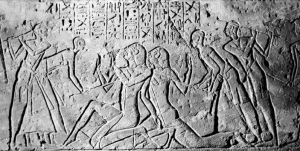
GOD ORDERED the Israelites to take revenge on the people of Midian. This is hard to understand, since Moses was married to a Midianite woman—until you consider the context of the spiritual war being waged around the Israelites.
We take a brief look at the Midianites and their identification by scholars with the Shasu, a nomadic people known from Egyptian texts. The Shasu were formerly known, in the time of Abraham, as Shutu, These are the “sons of Sheth” mentioned in the messianic prophecy of Balaam son of Beor (Numbers 24:17), who was one of the victims of Israel’s attack on the Midianites.
The Shutu were called Suteans in Mesopotamia, but prior to Abraham, they were called the Tidanu—an Amorite tribe that contributed to the downfall of the last Sumerian kingdom and from whom the Greeks took the name of their “old gods,” the Titans.
So, there was a lot more going on with the Midianites than competition for land and resources in the Transjordan. This is linked to the heresy of Baal-Peor (see our study on Numbers 24), the god called El by the Canaanites, Dagon by the Amorites and Philistines, and later, Kronos by the Greeks, and Saturn by the Romans. Derek argues in his forthcoming book The Second Coming of Saturn that these names are just alternate identities worn by the chief of the rebellious Watchers, the sons of God from Genesis 6, Shemihazah.
We also discuss briefly the significance of an inscription from the time of Pharaoh Amenhotep III (reigned c. 1408–1372 BC) that mentions “Yahweh of the land of the Shasu.” Considering that his grandfather, Amenhotep II (1455–1418 BC) was the Pharaoh of the Exodus, it’s logical to find Amenhotep III associating Yahweh with the Shasu (i.e., Midian), the land to which Moses fled.
Finally, we talk about the command God gave Moses for the men of Israel regarding vows or oaths sworn to God, and why this is consistent with His design for the family and the role of men as spiritual covering for their wives and daughters.
Cancel the cancellers! Subscribe to the new SkyWatchTV channel at Rumble: www.rumble.com/skywatchtv.
NOTE: New dates for our tour of Israel! We will lead our next tour through the Holy Land March 25–April 3, 2025, with an optional three-day extension to Jordan featuring visits to Mount Nebo, Wadi Rum, and Petra. Our special guests are Timothy Alberino, Dr. Judd Burton, and Doug Van Dorn!
For more information, log on to www.GilbertsInIsrael.com.
Our book Giants, Gods & Dragons is available in Kindle and paperback! Get it as part of a great package with more than 27 hours of our video teachings at the SkyWatchTV Store or at Amazon.com.
Click here for the complete archive of our New Testament Bible studies to date, and click here for the Old Testament studies to date. Or go to www.spreaker.com/show/gilbert-house-fellowship for all of the audio.

I have not listen to it yet. I was just happy to see a Gilbert House fellowship and Praising God ! Thank you so much!♥️🙏
There’s 2 types of vows. The NEDER vow is when a man vows to God. The ISSAR vow is the when a man swears an oath to bind his soul with a bond. Tithing is neder and marriage is issar.
The Bible clearly states that a vow is a very serious thing and is not to be taken lightly (see Eccl. 5:4-6).
Could the vessels of the sanctuary in 31:6 include the ark of the covenant, which would be taken into combat in the future (see Josh 6:4-13 and 1 Sam 4:3-6)? Not one man was lost in the war, and the plunder they receive is incredibly large (see v. 32-35, 52).